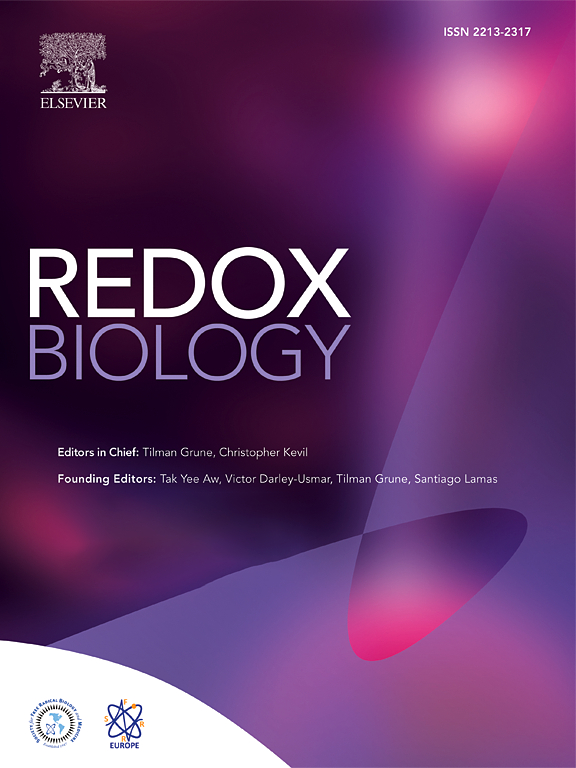Insulin oxidation and oxidative modifications alter glucose uptake, cell metabolism, and inflammatory secretion profiles
IF 10.7
1区 生物学
Q1 BIOCHEMISTRY & MOLECULAR BIOLOGY
引用次数: 0
Abstract
Insulin participates in glucose homeostasis in the body and regulates glucose, protein, and lipid metabolism. Chronic hyperglycemia triggers oxidative stress and the generation of reactive oxygen species (ROS), leading to oxidized insulin variants. Oxidative protein modifications can cause functional changes or altered immunogenicity as known from the context of autoimmune disorders. However, studies on the biological function of native and oxidized insulin on glucose homeostasis and cellular function are lacking. Native insulin showed heterogenous effects on metabolic activity, proliferation, glucose carrier transporter (GLUT) 4, and insulin receptor (INSR) expression, as well as glucose uptake in cell lines of five different human tissues. Diverse ROS compositions produced by different gas plasma approaches enabled the investigations of variously modified insulin (oxIns) with individual oxidative post-translational modification (oxPTM) patterns as identified using high-resolution mass spectrometric analysis. Specific oxIns variants promoted cellular metabolism and proliferation in several cell lines investigated, and nitrogen plasma emission lines could be linked to insulin nitration and elevated glucose uptake. In addition, insulin oxidation modified blood glucose levels in the chicken embryos (in ovo), underlining the importance of assessing protein oxidation and function in health and disease.
胰岛素氧化和氧化修饰会改变葡萄糖摄取、细胞代谢和炎症分泌情况。
胰岛素参与体内葡萄糖平衡,并调节葡萄糖、蛋白质和脂质代谢。长期高血糖会引发氧化应激,产生活性氧(ROS),导致胰岛素变体氧化。氧化蛋白修饰可导致功能性改变或免疫原性改变,这在自身免疫性疾病中已为人所知。然而,有关原生胰岛素和氧化胰岛素对葡萄糖稳态和细胞功能的生物功能的研究还很缺乏。原生胰岛素对新陈代谢活性、增殖、葡萄糖载体转运体(GLUT)4 和胰岛素受体(INSR)的表达以及五种不同人体组织细胞系的葡萄糖摄取显示出不同的影响。采用不同的气体等离子体方法产生的 ROS 成分各不相同,因此能够研究出不同的修饰胰岛素(oxIns),并通过高分辨率质谱分析确定了它们各自的氧化翻译后修饰(oxPTM)模式。特定的氧化胰岛素变体促进了所研究的几种细胞系的细胞代谢和增殖,氮气等离子体发射线可能与胰岛素硝化和葡萄糖摄取增加有关。此外,胰岛素氧化改变了鸡胚胎(卵内)的血糖水平,突出了评估健康和疾病中蛋白质氧化和功能的重要性。
本文章由计算机程序翻译,如有差异,请以英文原文为准。
求助全文
约1分钟内获得全文
求助全文
来源期刊

Redox Biology
BIOCHEMISTRY & MOLECULAR BIOLOGY-
CiteScore
19.90
自引率
3.50%
发文量
318
审稿时长
25 days
期刊介绍:
Redox Biology is the official journal of the Society for Redox Biology and Medicine and the Society for Free Radical Research-Europe. It is also affiliated with the International Society for Free Radical Research (SFRRI). This journal serves as a platform for publishing pioneering research, innovative methods, and comprehensive review articles in the field of redox biology, encompassing both health and disease.
Redox Biology welcomes various forms of contributions, including research articles (short or full communications), methods, mini-reviews, and commentaries. Through its diverse range of published content, Redox Biology aims to foster advancements and insights in the understanding of redox biology and its implications.
 求助内容:
求助内容: 应助结果提醒方式:
应助结果提醒方式:


